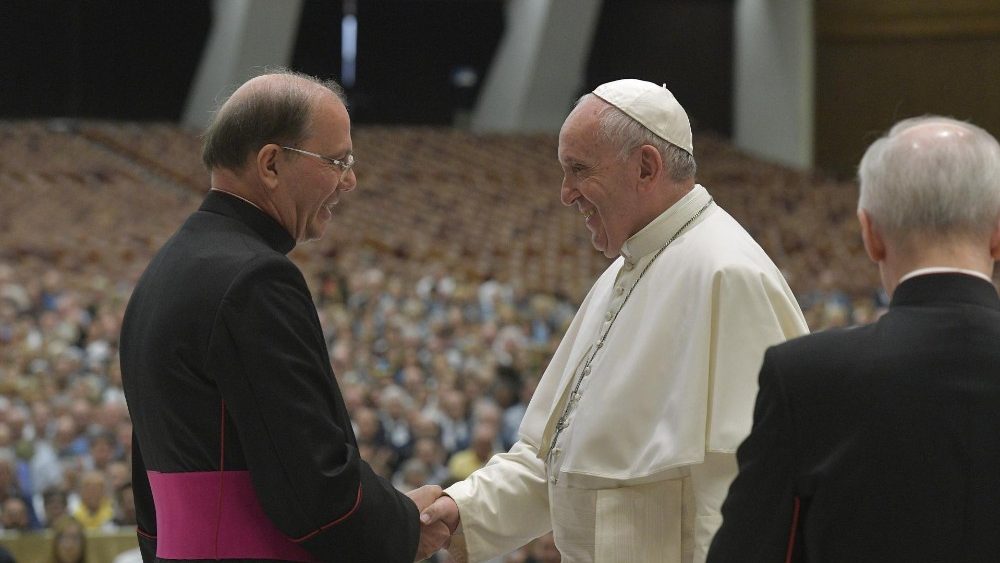
Address of the Holy Father Francis to the Scholae Cantorum of the Italian Saint Cecilia Association
Paul VI Audience Hall
Saturday, September 28, 2019
Dear brothers and sisters,
I welcome all of you, the president Monsignor Tarcisio Cola, whom I thank for his words; the Board of Directors, and you, cantors, choir directors, organists, who have come from the various parts of Italy.
You are part of the meritorious Italian Saint Cecilia Association, 140 years old from its foundation and still alive and working and desiring to serve the Church. The affection and esteem of the Pope for this Association are well known, in particular St. Pius X, who gave the people of God a synthesis of teaching on sacred music (cf. Motu Proprio Tra le sollecitudini, November 22, 1903). St. Paul VI wanted you to be renewed and active for a music that is integrated with the liturgy and draws its fundamental characteristics from it. Not just any music, but a holy music, because the rites are holy; adorned with nobility of art, because for God we must give the best; universal, so that everyone can understand and celebrate. Especially, it should be well distinct and different from the music used for other purposes. And he recommended that you cultivate the sensus ecclesiae, discernment of music for the liturgy. He said, “Not everything is valid, not everything is lawful, not everything is good. Here the sacred music must be joined with the beautiful in a harmonious and devout synthesis.” (Discourse to religious women dedicated to liturgical chant, April 15, 1971). Benedict XVI exhorted you to not forget the musical heritage of the past, to renew it and increase it with new compositions.
Dear friends, I too encourage you to continue on this road. To be an Association is a resource: it helps you to generate movement, interest, commitment to better serve the liturgy. An Association that is not the originator or owner of any music, but has love and fidelity to the Church as its program. Together you can devote yourselves better to song as an integral part of the Liturgy, with Gregorian chant inspiring you as the first model. Take care together for artistic and liturgical preparation, and promote the presence of the schola cantorum in every parish community. In fact, the choir guides the assembly, and with its own specific repertoire, is a skilled voice of spirituality, of community, of tradition, and of liturgical culture. I recommend that you help the whole people of God to sing, with conscious and active participation and in the Liturgy. This is important: closeness to the people of God.
The fields of your apostolate are various: the composition of new melodies, promoting chant in seminaries and houses of religious formation; supporting parish choirs, organists, schools of sacred music, and youth. To sing, to play, to compose, to direct, to make music in the Church are among the most things for the glory of God. It is a privilege, a gift of God, to express musical art and aid participation in the divine mysteries. A beautiful and good music is a privileged instrument for approaching the transcendent, and often helps even distracted people understand a message.
I know that your preparation involves sacrifices connected with finding time to devote to practice, with getting people involved, with carrying out feast days when perhaps your friends invite you to come and have fun. So many times! But your dedication to the liturgy and to its music represent a way of evangelization at all levels, from children to adults. The Liturgy is in fact the first “teacher” of catechism. Don’t forget this: the Liturgy is the first “teacher” of catechism.
Sacred music also reveals another duty, that of joining Christian history together: in the Liturgy resound Gregorian chant, polyphony, congregational song, and music of the present day. It is as though all the generations, past and present, were there to praise God, each with its own sensibility. What is more, sacred music and music in general builds bridges, brings people closer, even those far away; it knows no barriers of nationality, ethnicity, skin color, but draws in everyone, in a higher language, and always succeeds in bringing into harmony people and groups, even of very different origins. Sacred music brings people closer, even with brothers to whom we sometimes do not feel close. For this reason, the singing group in every parish is a group where there is an atmosphere of availability and mutual help.
For all of this, dear brothers, I thank you and encourage you. The Lord help you to be constant in your commitment. The Church esteems the service that you present in the community: you help it to feel the attraction of the beautiful, which detoxifies us from mediocrity, lifts us higher, toward God, and unites hearts in praise and in tenderness. I bless you and all the members of the Saint Cecilia Association. May our Lady protect you. And since he who sings prays twice, I trust that you will also pray for me. Thank you!
(translation by RC from the Italian original text, edited)
